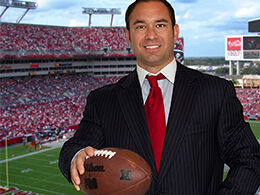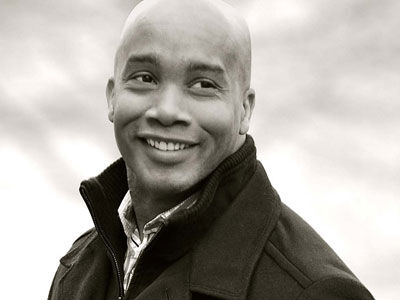Judges, lawyers and gravity: The rise of immigrant lawsuits
National News

Audio By Carbonatix
9:11 AM on Monday, September 15
In February 2004, a pair of workers attempted to roll an 800-pound reel of wire down some steps in the New York Stock Exchange using a crude rope sling. The reel tumbled forward, one of the workers got his fingers caught in the rope and a lucrative new business for plaintiff lawyers was born.
In a pivotal 2009 decision, New York’s highest court decided that Labor Law Section 240, which was first passed in 1885 to protect workers injured on dangerous construction sites, applied to almost any workplace accident involving a building and the force of gravity.
Plaintiff lawyers seized upon the decision in Runner v. NYSE to file lawsuits against building owners, general contractors and anyone else involved in a construction project who could plausibly be blamed for a worker’s injury.
A decade later, politics provided a huge boost to so-called Scaffold Lawsuits. Joseph Biden won the presidency and effectively opened the southern border to a flood of more than 8 million Latin immigrants. Tens of thousands of them wound up in New York, providing a ready supply of workers willing to sign their names to Section 240 complaints in exchange for a few thousand dollars in cash up front.
Lawsuits filed by Subin Associates, which specializes in construction injury litigation, surged 61% from 2018 to 2023. It filed 707 cases in New York courts in 2023, most of them involving plaintiffs with Latin names. Gorayeb & Associates, which says on its website it is “recognized within the Hispanic community as `The People's Lawyers,’” saw a more modest 26% increase over the same period, also mostly naming Latino plaintiffs.
Section 240 was the ideal vehicle for plaintiff firms because New York judges had earlier determined the loosely worded law meant defendants had almost no way to fight a claim. Even if the plaintiff bore most of the blame for his accident, the defendant companies were liable.
Unique in the U.S., the law also allows plaintiffs to double-dip, collecting from the Workers’ Compensation system while pursing a potential multimillion-dollar claim in civil court.
Insurers who pay to defend and settle these cases soon picked up on the trend. Lawsuits insurers filed in state and federal court claim the increase in construction accidents wasn’t due to chance, but because plaintiff lawyers seized upon the presence of thousands of poorly educated, undocumented immigrants to file fraudulent injury suits and sent them to doctors willing to perform unnecessary surgeries to drive the value of the claim up.
As alleged in those lawsuits, a network of runners in the immigrant community, some of them connected to Latin gangs, recruited plaintiffs by promising them thousands of dollars up front if they’d go to a lawyer’s office and sign some papers. Those papers – typically in English, although many of the plaintiffs speak only Spanish – included a claim of injury as well as an agreement to borrow money against the value of the lawsuit at usurious interest rates of 50% a year or more (in New York, lawsuit loans aren’t subject to consumer lending rules).
Investigators found evidence of the scheme in plain sight. An insurance industry claims database identified a number of “hotspots,” or addresses where residents have filed hundreds of claims. One 67-unit building in New York has 300 claims including 11 filed by a single resident. Exo Insurance found 13 Subin clients were connected to a single apartment at 2011 Amsterdam Ave. in New York. One of them, Isaha Hernandez, sued the building owners themselves for a slip-and-fall.
Illustrating the central role medical records and financing play in these cases, Subin name partner Herbert Subin shares a patent covering software to track patient medical records with the owner of a finance firm that extends loans to doctors.
Subin and Gorayeb didn’t respond to requests for comment. In an editorial published earlier this year, Victoria Wickman, president of the New York State Trial Lawyers Association, criticized insurers for “aggressive, defamatory legal filings aimed squarely at intimidating the injured from making valid claims.”
“If anything sounds like a coordinated effort, it's the successive filings of these RICO actions,” Wickman wrote.
As in court systems across the country, litigation on this scale requires two parties to work: Lawyers and judges. New York’s trial judges are elected and are routinely asked to adapt the law to benefit plaintiff lawyers.
Lawyers attempt to tie most injuries to gravity to invoke the Scaffold Law. Judges must decide whether a heavy pipe or piece of wood falling over can be chalked up to gravity, or if gravity is to blame when a worker twists their ankle while descending stairs.
And insurance defense lawyers complain most New York judges refuse to allow defendants to obtain a plaintiff’s medical records from before a claimed accident to determine whether the injury predates the claim.
Speaking on condition of anonymity because he appears frequently before these same judges, a defense lawyer said: “How can you know what someone’s future pain and suffering will be due to an accident when you don’t know their prior condition?”
There are also vast differences in the value of a claim based on which court district it is brought in.
“I’m in Suffolk county – the same claim might be $50,000-$100,000 here, but in the Bronx that is a $700,000 claim,” said Jason Bartow, a broker who sells commercial insurance through his family’s brokerage in New York.
Ionian Insurance, in a lawsuit against Gorayeb and other alleged co-conspirators filed in state court in New York, says its outstanding liability, or pending claims, skyrocketed more than 700% between 2021 and 2023, mainly because of questionable construction claims. This increase contrasts with a steady decrease in reported workplace injuries in New York over the same time.
One Subin client filed three lawsuits and a workers’ compensation claim over the same alleged accident, even though an eyewitness testified they saw the plaintiff undo his safety harness and jump off a platform. Subin withdrew from the case after it was sued by Tradesman Insurance in 2024, but insurance executives say there are thousands more such lawsuits still working their way through New York courts.
“Most insurance companies are not staffed to deal with organized crime,” said Don Orlando, who heads an investigative group at Tradesman that includes former FBI, CIA and military intelligence officers.
Clearly someone at Subin was worried about the quality of the firm’s workplace-injury claims. Citing letters from insurance companies identifying “a pattern of fraud within the construction industry as to Scaffold Law cases,” Subin last year quietly withdrew as counsel in more than 200 lawsuits. In each case, the firm said it was withdrawing on the advice of an outside ethics expert, but declined to provide further details to the court.
At one hearing in January, an insurance lawyer sought in vain to get more information about exactly why Subin was pulling out of a workplace-injury case and whether it was because the client was referred by a well-known “referral source” or runner named Jorge Lupi. Subin’s lawyer would only say the information was protected by the attorney-client privilege.
“Otherwise known as keeping your distance,” quipped Judge Robert J. Caloras. He then ruled against any further disclosure.
While some firms, like Subin, have scaled back their construction-injury lawsuits, the immigrant community is still providing thousands of plaintiffs for routine slip-and-fall and auto accident cases. The business is so lucrative that Gorayeb found itself on the receiving end of a lawsuit by rival Ginarte Gonzalez & Winograd for swapping the Gorayeb name into Ginarte’s tagline on television ads: “ACCIDENTE DE CONSTRUCCIÓN, GINARTE ES LA SOLUCIÓN.”
“Members of the public, legal community, media, and most importantly, workers and prospective clients in the Spanish-speaking construction business, associate the tagline/mark exclusively with the Ginarte law firm and the excellent services provided by the firm,” the law firm complained. Potential clients are “likely to be confused” by the similarity, the firm said.







